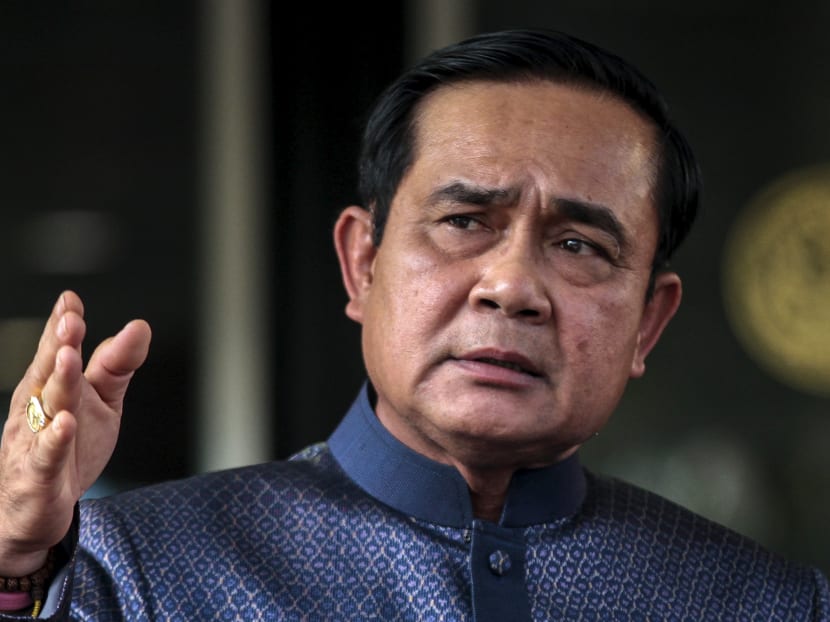Thai PM must visit blast victims to lift morale
There are few words to describe the feelings of Thai nationals and their global neighbours following the horrendous act of terrorism that took place earlier this week. The death toll stands at 20 dead — both Thais and tourists — and more than 120 injured.

Thailand's Prime Minister Prayuth Chan-ocha answers questions from journalists after a cabinet meeting at Government House in Bangkok, Thailand, August 18, 2015. Photo: Reuters
There are few words to describe the feelings of Thai nationals and their global neighbours following the horrendous act of terrorism that took place earlier this week. The death toll stands at 20 dead — both Thais and tourists — and more than 120 injured.
Shocked? Yes. Grieving? Undoubtedly. Uncertain over what the future holds? That is the pervading question in everyone’s minds.
While police continue to hunt down those behind the malicious act — starting with the yellow T-shirted “foreigner” who left the bomb — the implications of the blast are likely to resonate for months ahead. The economy is not immune to its effects either.
It seems common sense to assume the blast will deter tourists from travelling here, and indeed, some tourist groups have already cancelled their tours. It’s a blow given that tourism remains one of the country’s beacons of hope amid the downbeat economic mood.
Tourism accounts for about 10 per cent of the country’s gross domestic product (GDP) and it has been on a robust growth path over the course of the year. In the year to date, more than 17.5 million visitors have entered the kingdom, which was a 31.6 per cent rise from the same period last year.
Tourism has seen its share of GDP rise from barely 6 per cent a few years ago to about 10 per cent — and the bulk of the tourism revenues are being derived from the Chinese market which accounts for just over 26 per cent of total inbound tourism.
It is easy to believe the bombing and choice of location — the Erawan shrine at busy Ratchaprasong intersection — was aimed at creating panic in the country. It is not that far a leap to suggest Chinese tourists were targeted in particular. There will be plenty of opportunity in the weeks ahead to play the blame game, with some putting incumbent Prime Minister Prayut Chan-o-cha at the head of that list.
He has bought himself no friends with his decision last month to deport 109 Uighur refugees back to China. Did strong international condemnation and local anger over this issue give rise to this violent and cowardly act? Or is it internal political strife that was the motivation behind the blast?
But one thing we can say today is that our prime minister — who says he is here to serve and bring about peace in this country — has failed to undertake a basic principle of being the leader of a nation.
Despite being this country’s leader, Thailand has not seen Gen Prayut visit any of the hospitals or even the site of the bombing to offer his condolences. A visit would surely go some way to assuring the public that daily life will continue and that the bomber’s hopes for our fears to mount have not been realised.
Globally, many leaders are keen to make such visits and public appearances mandatory. Earlier this year, US President Barack Obama visited the French Embassy in Washington DC to express his solidarity with the French people over the attack on satirical newspaper Charlie Hebdo. Such acts are not reserved to democracies either. Even in communist China, Premier Li Keqiang made a point of visiting the site of the recent Tianjin blast.
Gen Prayut, it seems, just continues to think he is the army chief, although I must admit that even army chiefs tend to visit their injured soldiers.
Our leader is in a different situation where he does not need approval of the masses, or so it seems. No wonder the latest poll by Bangkok University shows his ratings have been on the decline since he assumed power just over a year ago.
The PM has instead ordered his lieutenants — his tourism minister and health minister — to go around hospitals and meet the victims. But if I was one of those injured, my question would be, where is the leader of my country?
A visit by Gen Prayut would show he is more than a military general, but a human being as well. It would resonate in the minds of Thai people for years. Think of how Thai netizens were so quick to praise Australian Prime Minister Tony Abbott for his strong words about continuing to support and visit Thailand.
Imagine the public relations success that a visit to hospital and possibly hugging some of the victims would have all across the world for Thailand and for the tourism sector overall. Rebuilding the confidence of the global community needs to start from the top down.
Umesh Pandey is editor of Asia Focus, Bangkok Post.
BANGKOK POST






